

Regeneration may cause isolation for older people, study finds. A study by an academic from The University of Manchester has found that urban regeneration in poor neighbourhoods can actually backfire, and lead to older people feeling isolated.
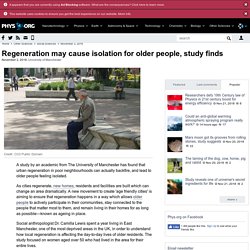
As cities regenerate, new homes, residents and facilities are built which can change an area dramatically. A new movement to create 'age friendly cities' is aiming to ensure that regeneration happens in a way which allows older people to actively participate in their communities, stay connected to the people that matter most to them, and remain living in their homes for as long as possible—known as ageing in place. Social anthropologist Dr. Camilla Lewis spent a year living in East Manchester, one of the most deprived areas in the UK, in order to understand how local regeneration is affecting the day-to-day lives of older residents. The study focused on women aged over 50 who had lived in the area for their entire lives. Explore further: Affecting the well-being of elderly urban residents. Potential contamination copper oxide nanoparticles possible consequences urban agriculture 505na3 en. Urban vegetation react car emissions decrease air quality summer Berlin 499na1 en.
Ceramic honeycomb air filters could cut city pollution. A new type of outdoor filter that could cut city air pollution and is scheduled to be debuted at the 2024 Paris Olympics has been awarded the €3 million Horizon Prize on materials for clean air.
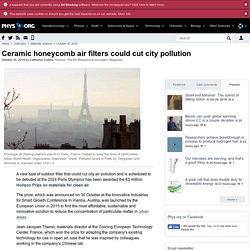
The prize, which was announced on 30 October at the Innovative Industries for Smart Growth Conference in Vienna, Austria, was launched by the European Union in 2015 to find the most affordable, sustainable and innovative solution to reduce the concentration of particulate matter in urban areas. Smart cities have the ability. With the amount of data available today, cities are constantly innovating, finding new ways to apply insights in ways that benefit citizens.
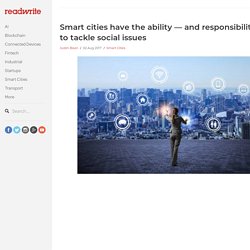
This is no small task, as new technologies are constantly reshaping what’s possible when it comes to using and making sense of data. Data creates opportunities. Cities are rife with challenges that not only impact their own residents but society at large. What would the ultimate child-friendly city look like? What would a truly disabled-accessible city look like?
To David Meere, a visually impaired man from Melbourne, among the various obstacles to life in cities is another that is less frequently discussed: fear.
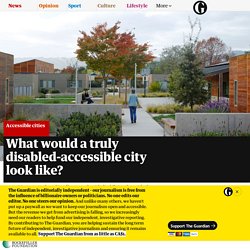
“The fear of not being able to navigate busy, cluttered and visually oriented environments is a major barrier to participation in normal life,” says Meere, 52, “be that going to the shops, going for a walk in the park, going to work, looking for work, or simply socialising.” That’s what makes an innovative project at the city’s Southern Cross train station so important to him. A new “beacon navigation system” sends audio cues to users via their smartphones, providing directions, flagging escalator outages and otherwise transforming what previously a “no-go” area for Meere. “I no longer have to hope there’s a willing bystander or a capable staff member to provide direct assistance,” he says. Sharing is caring. So why are European cities falling behind? New mobility services like Uber and Lyft offer the potential to get cities moving, improve quality of life and reduce emissions.
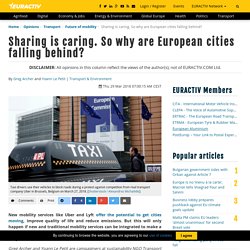
But this will only happen if new and traditional mobility services can be integrated to make a more attractive offering that finally persuades drivers out of their cars, write Greg Archer and Yoann Le Petit. Greg Archer and Yoann Le Petit are campaigners at sustainability NGO Transport & Environment (T&E). It is increasingly accepted that vehicles in the next decade will be transformed both through electric powertrains and driverless technologies. But whether sharing – the “third mobility revolution” – will take-off or remain niche in Europe remains in the balance.
Green gentrification can limit the favorable effects of green areas on health. The creation of parks and green areas in urban centres have positive effects on the health of residents.

However, a new article published by the research group at the Institute of Environmental Science and Technology of the Universitat Autònoma de Barcelona (ICTA-UAB) and the Municipal Institute for Medical Institute of the Hospital del Mar (IMIM) suggests that more socially disadvantaged neighbours could be pushed aside when it comes to the health effects of "ecologisation" and may not benefit equally from these positive effects on health. Do green neighbourhoods promote urban health justice? - The Lancet Public Health. How Greening Strategies Are Displacing Minorities in Post-Harvey Houston – The Nature of Cities. On 14 June 2018, Isabelle Anguelovski participated in the panel Designing, Planning and Paying for Resilience at Rice University Kinder Institute for Urban Research, where she and other leading experts discussed flood mitigation strategies such as low impact design, green infrastructure and urban-scale greenspace preservation, and how they interact with a community’s broader planning efforts.
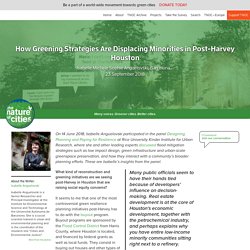
These are Isabelle’s insights from the panel. Can we green cities without causing gentrification? Many indexes aim to rank how green cities are.
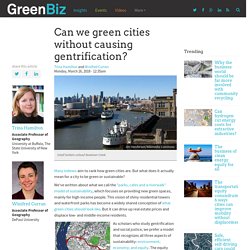
But what does it actually mean for a city to be green or sustainable? Gentrification, Displacement, and the Role of Public Investment - Miriam Zuk, Ariel H. Bierbaum, Karen Chapple, Karolina Gorska, Anastasia Loukaitou-Sideris, 2018. Author Biographies Miriam Zuk, PhD, is the director of the Center for Community Innovation at the University of California, Berkeley.
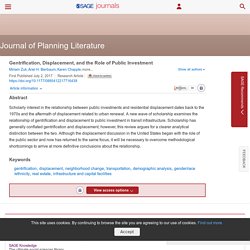
Her research focuses on equitable urban development, affordable housing, and environmental justice. She was previously the deputy director of Air Quality Research for the Mexican Ministry of Environment in Mexico City. Gutsy, organised Londoners have learned to stop gentrification in its tracks – here's how.